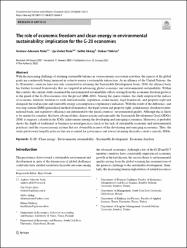| dc.contributor.author | Alola, Andrew Adewale | |
| dc.contributor.author | Alola, Uju Violet | |
| dc.contributor.author | Akdağ, Saffet | |
| dc.contributor.author | Yıldırım, Hakan | |
| dc.date.accessioned | 2023-10-05T22:59:33Z | |
| dc.date.available | 2023-10-05T22:59:33Z | |
| dc.date.issued | 2022 | en_US |
| dc.identifier.issn | 0944-1344 | |
| dc.identifier.issn | 1614-7499 | |
| dc.identifier.uri | https://hdl.handle.net/11363/5774 | |
| dc.description.abstract | With the increasing challenge of attaining sustainable balance in socioeconomic-ecosystem activities, the aspects of the global
goals are continously being harnesed in order to ensure a sustainable interaction. As an alliance of the United Nations, the
G-20 member countries have not only committed to attaining the Sustainable Development Goals 2030, the alliance body
has further fostered frameworks that are targeted at advancing global economic and environmental sustainability. Within
this context, the current study examined the environmental sustainability efects arising from the economic freedom prowess
in the panel of the G-20 economies over the period 2000–2016. Among the sparse studies, the study employed the indices
of economic freedom: freedom to trade internationally, regulation, sound money, legal framework, and property right and
alongside the real income and renewable energy consumption as explanatory indicators. With the result of the diference- and
two-step system GMM (generalized method of moments), the legal system and property right, sound money, freedom to international trade, and regulatory efciency are detrimental to the panel countries’ environmental quality. Although this is likely
to be untrue for countries that have advanced their climate actions and especially the Sustainable Development Goals (SDGs)
2030, it suggests a dearth in the SDGs achievement among the developing and emerging economies. Moreover, it probably
shows the depth of traditional or business-as-usual practices (such as the lack of sustainable economic and environmental
practices) and the socioeconomic system that are obtainable in most of the developing and emerging economies. Thus, the
study put forward tangible policies that are essential for governance and toward attaining desirable country-specifc SDGs. | en_US |
| dc.language.iso | eng | en_US |
| dc.publisher | SPRINGER HEIDELBERG, TIERGARTENSTRASSE 17, D-69121 HEIDELBERG, GERMANY | en_US |
| dc.relation.isversionof | 10.1007/s11356-022-18666-5 | en_US |
| dc.rights | info:eu-repo/semantics/openAccess | en_US |
| dc.rights | Attribution-NonCommercial-NoDerivs 3.0 United States | * |
| dc.rights.uri | http://creativecommons.org/licenses/by-nc-nd/3.0/us/ | * |
| dc.subject | G-20 | en_US |
| dc.subject | Clean energy | en_US |
| dc.subject | Environmental sustainability | en_US |
| dc.subject | Sustainable development | en_US |
| dc.subject | Economic freedom | en_US |
| dc.title | The role of economic freedom and clean energy in environmental sustainability: implication for the G‑20 economies | en_US |
| dc.type | article | en_US |
| dc.relation.ispartof | Environmental Science and Pollution Research | en_US |
| dc.department | İktisadi İdari ve Sosyal Bilimler Fakültesi | en_US |
| dc.identifier.volume | 29 | en_US |
| dc.identifier.issue | 24 | en_US |
| dc.identifier.startpage | 36608 | en_US |
| dc.identifier.endpage | 36615 | en_US |
| dc.relation.publicationcategory | Makale - Uluslararası Hakemli Dergi - Kurum Öğretim Elemanı | en_US |
| dc.contributor.institutionauthor | Alola, Uju Violet | |
| dc.contributor.institutionauthor | Yıldırım, Hakan | |



















